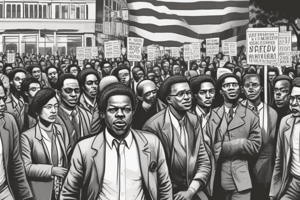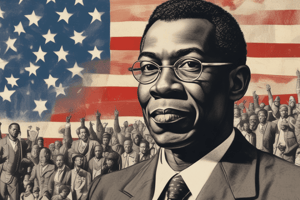Podcast
Questions and Answers
The practice of selective incorporation means that the Bill of Rights will
The practice of selective incorporation means that the Bill of Rights will
- Sometimes be applied to the states by the court (correct)
- Always be applied to the states
- Never be applied to the states
- Only apply to federal government
What does the clause in the Fourteenth Amendment give Congress the power to do?
What does the clause in the Fourteenth Amendment give Congress the power to do?
Make laws to apply the amendment
What does the enforcement clause of the Fourteenth Amendment state?
What does the enforcement clause of the Fourteenth Amendment state?
Congress has the authority to make laws to apply the amendment
How did the federal government begin to extend civil rights to African Americans after the Civil War?
How did the federal government begin to extend civil rights to African Americans after the Civil War?
What does the cartoon show about the federal government's role?
What does the cartoon show about the federal government's role?
What does the citizenship clause of the Fourteenth Amendment state about naturalized persons?
What does the citizenship clause of the Fourteenth Amendment state about naturalized persons?
What is the focus of the clause regarding privileges or immunities of citizens in the Fourteenth Amendment?
What is the focus of the clause regarding privileges or immunities of citizens in the Fourteenth Amendment?
What actions did the United States take to extend civil rights of slaves after the Civil War?
What actions did the United States take to extend civil rights of slaves after the Civil War?
Why did the Fourteenth Amendment make the Constitution superior to state law?
Why did the Fourteenth Amendment make the Constitution superior to state law?
Which amendment resulted in the incorporation of the Bill of Rights?
Which amendment resulted in the incorporation of the Bill of Rights?
Flashcards are hidden until you start studying
Study Notes
Selective Incorporation
- Selective incorporation allows portions of the Bill of Rights to apply to states via judicial processes.
Enforcement Clause
- The Fourteenth Amendment grants Congress the power to legislate and enforce its provisions.
Civil Rights Protection
- Post-Civil War, the federal government facilitated civil rights advancements through constitutional amendments.
Citizenship Rights
- The citizenship clause mandates equal citizenship rights for naturalized citizens and those born in the U.S.
Legislative Authority
- The enforcement clause in the Fourteenth Amendment empowers Congress to establish laws pertinent to the amendment.
Equal Protection
- The amendment ensures that states cannot create laws that infringe upon the privileges and immunities of U.S. citizens.
Post-War Amendments
- The Thirteenth Amendment abolished slavery, while the Fourteenth Amendment provided additional protections for former slaves.
Supremacy of the Constitution
- The Fourteenth Amendment establishes that the Constitution is superior to state laws through the incorporation of the First Amendment.
Bill of Rights Incorporation
- The incorporation of the Bill of Rights into state law primarily stems from the Fourteenth Amendment.
Studying That Suits You
Use AI to generate personalized quizzes and flashcards to suit your learning preferences.




